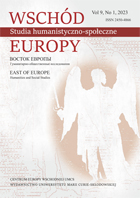Етапи розвитку медіадосліджень у західній соціології: формування пропагандистських моделей та їх вплив на зміни масової свідомості громадськості
The stages of media research development in Western sociology: the formation of propaganda models and their influence on changes in the mass consciousness of the public
Author(s): Ivanna Makuch-FedorkovaSubject(s): Media studies, Theory of Communication, Crowd Psychology: Mass phenomena and political interactions
Published by: Wydawnictwo Naukowe Uniwersytetu Marii Curie-Sklodowskiej
Keywords: theories of propaganda; mass communication; media research; impact of mass communication; public opinion; mass consciousness;
Summary/Abstract: At the end of the 1920s and the beginning of the 1930s, scientists became interested in the media as a subject of research, and there was also a concrete practical implementation of the technologies of mass media influence in political life. The defining feature of this period was the limitless power of the mass media to influence human behavior through persuasion, and the impetus for such conclusions was given by the successes of the Entente states in the First World War. Also, the targeted influence of the media on the public and the development of the PR system helped not only the American presidents to influence the domestic audience in the USA and beyond, but also the largescale propaganda influence helped A. Hitler comes to power. At the first stage of the study of mass communications and the theory of propaganda, two scientific directions are distinguished: the Chicago school of pragmatism, represented by American researchers, and the Frankfurt school, which was developed by European scientists. Analysis of their research demonstrated the superiority of one-way communication, and the means of mass-communication influence was the power of persuasion, with the help of which the audience was deprived of critical thinking and turned into passive participants in communication. This laid the foundation for the first theories of propaganda, which were effectively used to achieve foreign policy goals by the then leaders.
Journal: Wschód Europy. Studia humanistyczno-społeczne
- Issue Year: 9/2023
- Issue No: 1
- Page Range: 123-137
- Page Count: 15
- Language: Ukrainian

